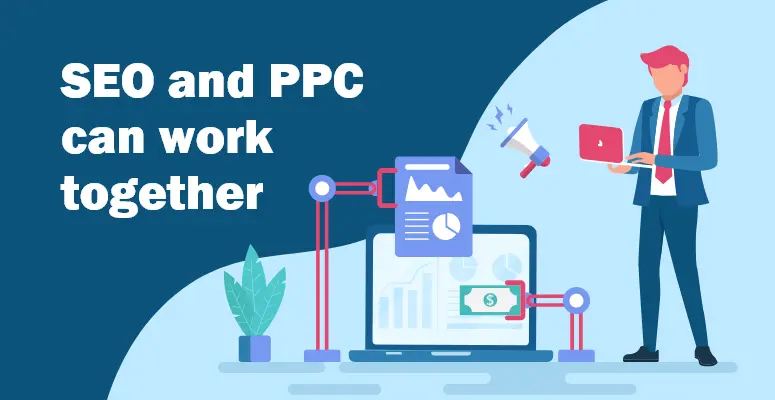
A common problem that both agencies and clients encounter is the need for more collaboration between SEO and PPC departments.
These two areas are often treated as separate entities, with their own distinct campaigns and strategies, despite the fact that they should work together seamlessly.
This can occur because each department or agency may have different traffic, sales, or conversion goals.
In this blog, we are going to discuss a sound, unconventional strategy that may give you an advantage over your competitor when you are open with these two channels.
Step 1: Understand How SEO Fits into Your Business
By understanding what other departments are doing, the keywords they are targeting, and how each department’s goals benefit the company, you can avoid wasting budget, time, and resources on overlapping keywords and more.
While it is possible to repair any harm caused by SEO and PPC targeting the same keywords, this process can be time-consuming and costly.
For PPC departments, stopping bids on overlapping terms can save money, but may also impact conversions.
For SEO teams, having keywords overlap with PPC search campaigns may result in less traffic or lost conversions that would have been attributed to this channel.
To avoid these issues, it is important for these departments to work together and collaborate.
This will not only help prevent these problems from occurring but also free up resources and budget to achieve marketing goals more effectively.
How to Combine SEO & PPC Goals

A key aspect of successful cross-functional collaboration is viewing sales and conversions as a shared goal.
To facilitate this, it is important to establish a communication plan before developing your next digital strategy.
This will allow you to take advantage of the knowledge and insights gained by each department. By working together and leveraging each other’s expertise, you can create a more effective and cohesive strategy.
Step 2: Define SEO & PPC Problems to Solve
To optimize your digital marketing strategy, consider the following questions:
- Are we paying for PPC traffic that could potentially be gained through SEO?
- Can we increase the impact of growing traffic by using both PPC and SEO together?
- Would our conversion rate be the same if we only used one channel (PPC or SEO)?
- Is our conversion rate higher for the same query on PPC or SEO?
By answering these questions, you and your SEO and PPC teams can create a comprehensive list of keywords to target on each channel.”
How to Overcome SEO and PPC Keywords Overlap
Let’s take a real-world example, a grocery retail client wanted to reduce their reliance on paid advertising channels, such as Google Ads, and instead increase their visibility on organic search results through SEO efforts.
They believed that by targeting specific keywords in their paid campaigns that they could rank well organically, they could stop bidding on those keywords and redirect that budget towards SEO efforts.
The client had a significant portion of their paid advertising budget going toward branded keywords.
However, it can sometimes be beneficial to continue bidding on branded keywords through paid channels in order to maintain a strong presence on the search results page.
Let’s illustrate this problem in chunks:
SEO Strategy
In this instance, the company is organizing its targeted keywords into specific, more specific, and broad categories. The specific keywords are referred to as “chunky middle” and “even long tail.”
The broader keywords are called “generics” and include a larger group of related keywords. The goal of this grouping is to organize the keywords into categories to better focus their efforts.
PPC Strategy
In this instance, the company is organizing its targeted keywords into broad and specific categories.
The broad keywords are referred to as “broad match” and include a larger group of related keywords.
The specific keywords are referred to as “exact match” and are more narrowly focused. The goal of this grouping is to organize the keywords into categories to better focus their efforts.
Final Result
In this scenario, the paid advertising efforts (PPC) will become increasingly specific over time, while the organic search efforts will start out focused on specific keywords but need to achieve good visibility in order to be effective.
Serpple Can Help you Zero-In your SEO Performance
By combining SEO and PPC efforts, a company can gather data to help optimize its campaigns and minimize unnecessary spending on both channels.
This can be achieved by analyzing the overlap and competition between keywords, determining which tactics work best for each channel, and understanding the appropriate times to utilize certain strategies. This approach can help improve the effectiveness of both SEO and PPC efforts.
With Serpple’s data granularity (daily ranks for desktop and mobile), businesses can zero in on their SEO performance and track every change.
In addition to the benefits of an integrated approach to SEO and PPC, using advanced filtering tools can allow a company to create and track specific groupings of keywords. This can help SEO professionals better manage their work and be more efficient in their efforts. One example of a tool that can assist with this is Serpple.
Watch this video to know the functionality of Serpple Rank Tracker.
Join us, in our quest to help SEO professionals by leveraging the power of this keyword rank-tracking tool.
Divanshu
Posted on March 14, 2023
Divanshu is an engineer turned marketer. As SEO Manager, he is responsible for implementing strategies that help Scrapingdog to increase brand awareness, generate leads and acquire new customers. When he isn't working you'll find Divanshu reading, watching thriller shows, or playing online games.




